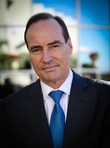Harry S. Dent Jr.'s Blog, page 98
October 25, 2016
The End of Truth
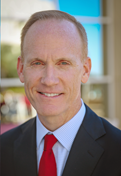 I’m tired, both mentally and physically. We just finished our three-day Irrational Economic Summit in Palm Beach, Florida, and the event ran at breakneck speed. From Harry’s opening comments to the closing panel I moderated with Harry and Dr. Lacy Hunt, the ideas and information never stopped.
I’m tired, both mentally and physically. We just finished our three-day Irrational Economic Summit in Palm Beach, Florida, and the event ran at breakneck speed. From Harry’s opening comments to the closing panel I moderated with Harry and Dr. Lacy Hunt, the ideas and information never stopped.
But the audience, both live and watching on our streaming service, needed it.
I needed it.
The conference served as a reminder of how things stand in our economy – low growth, exceptionally low interest rates, low productivity – instead of what we’re usually told to believe.
And it shows us how best to move forward.
Lacy put a fine point on the notion by referencing a work of F. A. Hayek, The Road to Serfdom. The book includes a chapter titled “The End of Truth,” in which Hayek explains how agencies (governments, etc.) use propaganda to shape the beliefs and actions of populations. To persuade the people, the agencies create a moral backstory or justification for their actions or view that offers opinions as facts. These creations often weave shared ideals into the narrative.
In the process, truth is killed to keep the propaganda alive.
It’s easy to see this from the outside when looking at countries like North Korea, where leaders portray America as the Evil Empire just waiting to invade, so all citizens must sacrifice to maintain a robust military that keeps the Americans at bay.
But it’s harder to spot when the same tactic is used in democracies because there’s not a single controlling interest. And yet, it still exists.
Borrowing Money from Tomorrow to Pay for Today
There are many examples in play today, but a main focus at IES was central bank action. It has become accepted truth that the Federal Reserve saved the nation from the next Great Depression, proven by the fact that, after they started intervening in the markets, the equity markets rebounded and the U.S. pulled out of recession. But does that really prove the point?
The Fed’s first quantitative easing (QE) program used $1.25 trillion to buy U.S.-guaranteed mortgage-backed bonds from banks. The move broke open a market that had become locked, which was good, but that’s why the Fed was set up in the first place. After that, successive QE programs were meant to foster economic growth, bring down unemployment and create inflation. Those all sound like great goals, so who would be against such things?
We’re in our sixth year of sub-3% growth, and most likely in the second year of sub-2% growth. Inflation exists in healthcare, housing and education, but deflation is the biggest risk. Sure, unemployment dropped, but can the Fed – or anyone else – prove that wouldn’t have happened anyway?
While the positive gains from central bank intervention are questionable, the unintended negative consequences are not. The international bond market is in a bubble, as are real estate prices, while savers are forced into risky assets to make ends meet. Government debt has exploded since the cost of carry (interest cost) makes additional debt seem inconsequential.
As Harry noted time and again throughout the conference: all bubbles burst. All of them. Without exception.
The Right Message, at the Right Time
U.S. economic growth isn’t about to explode, no matter how many times we’re told such a thing is just around the corner. Real estate prices from Vancouver to London are fading. Chinese growth is slowing and their own property bubble will cause shockwaves when it pops.
And yet, all of us must navigate our way through these times. We have to protect and grow our wealth the best we can. That’s why, in addition to global thinkers and luminaries, we also heard from Dent Research speakers who provided actionable ideas, like Adam O’Dell, Lance Gaitan, John Del Vecchio and Ben Benoy.
They got great feedback from the 400 to 500 people that joined us live at the event, and positive comments from the additional audience that tuned in online. (You can access the IES Digital Replay Kit here.)
It was the right conference, with the right message, at the right time. As long as we’re able to come together and share such information and ideas, we can fight to find the truth, and even plan a profitable way forward.

Rodney
Follow me on Twitter @RJHSDent

The post The End of Truth appeared first on Economy and Markets.
October 24, 2016
Seeing Is Believing
I’ve been working on Dent’s editorial team for almost a year and a half now, and in that time, I’ve read a lot of copy.
I mean, a lot of copy.
Sometimes I’m still amazed by all of the information we send out on a daily basis.
By now, I’ve had the opportunity to work with all of our different editors. I’ve read their newsletters, watched their videos, chatted with them over the phone, and even gotten a drink or two with them at company functions.
But the one thing that I haven’t done, in all this time, is watched them give a presentation in person, live and up on stage.
And let me tell you – seeing is believing.
The information just transfers differently. It’s real… more engaging. And if I have a question about something that, say, Rodney talked about during his presentation on the death of the dollar, I don’t have to do a Google search to find out what I’m looking for.
Instead, I can just ask him my question when he gets off-stage.
It’s that personalized one-on-one time that, for me, made this weekend different and so incredibly valuable. And I hope that all of our readers who came out to this year’s Irrational Economic Summit felt the same way.
Now, I know that not everyone has the time to check their email over the weekend, so for those of you who might have missed an update or two, here’s a quick recap of our Summit events in Palm Beach…
Harry kicked us off by telling audience members about the opportunities that will be available during the upcoming “sale of a lifetime” – a period of time that will directly correlate with the next market crash.
What you need to understand is this: the crash that Harry’s forecasting is going to be more devastating than the Great Depression was during the 1930s. It will annihilate everyone in its path – no exceptions. In fact, it’s the usually safe-in-their-ivory-towers 0.01%-10% of the population who will see the greatest hit to their finances in the years ahead. And that bust period – or, what Harry likes to call the winter deflationary season – is fast approaching, so now is the time to start preparing.

Harry discussing who will be most affected by the crash in the next few years.
Luckily, those in the U.S. will have an advantage over the rest of the world, and it’s called the dollar. As Rodney explained in his presentation on Friday, the buck isn’t going anywhere any time soon. As a matter of fact, it’s probably the best crisis hedge that you can have.
This is something that Raoul Pal really drove home when he talked about his macro view of the global economy. He explained that right now, the world is desperately short of dollars, making those who have their wealth tied to our currency all the richer.
And Dr. Lacy Hunt reminded us all how we got to this problem in the first place. Not to point a finger, but… thanks, Keynesians.
You see, as Lacy explained, the federal government has tried desperately to sell off its debt in recent years. The problem is that we’ve seen a shift in savings going from the private sector to the public sector as a way to pay for it – and it’s put a real hurting on savers in the middle and lower classes.
Those who don’t have a lot of money in the first place generally don’t make the effort to “do their part” to stimulate the economy, a concept that the federal government just can’t seem to wrap its head around. So what we’ve seen is a gradual decline in spending, a slowing economy, and historically low interest rates as a result.
It’s a problem that no amount of easy-money is going to fix… but don’t be surprised if you see Fed officials trying it again anyway.
However, should they ever get their heads out of the sand and decide to implement some real monetary reform, David Walker has some amazing ideas on how to cut unnecessary spending and get our country back towards a more balanced budget.
In the meantime, there are plenty of ways to both make and save your money in this environment, and we saw a whole host of them over the last few days.
Charles showed us how to make great value investments despite high stock prices and abnormally low periods of volatility…
Adam taught us that investors tend to base their decisions off of a fight-or-flight fear response, and how to avoid doing just that…
John gave us insider knowledge about companies who fudge their numbers and rip off investors to pay themselves before their shareholders, and how to find quality companies that actually put you first…
Ben unveiled his new MarketVOX Intel Trader service, and how with it, he can search through over 3.9 million pieces of market intelligence to “hear” what high-level execs and investors are thinking…
And Lance taught us how to turn a profit off of interest rate volatility – whether rates go up, down or sideways.
This year’s Summit really had something for everyone. We went into it wanting to not only give you the big picture of what lies ahead, but also show you a variety of different ways to deal with it – whatever that looks like for you.
I’d say that after some 30-plus hours of non-stop insider tips and insight, we succeeded (and then some).
For those of you who weren’t able to make it out, there’s still time to order our 2016 Irrational Economic Summit Digital Replay Kit. With it, you’ll have access to many of the great presentations that our speakers gave this year, six of our workshops (audio only), and a digital copy of Harry’s latest book, The Sale of a Lifetime.
We also hope you’ll come out and join us next year in Nashville. We’ll let you know what days to mark in your calendars when we’ve nailed those down.
Before I go, I just wanted to acknowledge a few people who worked so hard to make our 2016 summit spectacular – Shannon Sands, our Publisher, Amanda Klein, our Conference Director, Megan Johnson, our Marketing Manager, Teresa van den Barselaar, our Editorial Director, Jacquie Talbot, our Member Services Specialist, Brendan Finnerty, our photographer, and everyone else who worked tirelessly behind the scenes.
Thank you to the editors – Harry, Rodney, Adam, Charles, Lance, John, and Ben – you guys were awesome.
These events take a village to pull together, and I’m so happy to be working with each and every one of you.
Also, a big thank you to all the experts who took to the stage: Dan Mitchell, the honorable David Walker, Chris Gaffney, Don Hosmer, Raoul Pal, Joe Wirbick, George Gilder, Josh Bennett, Barry Potekin, Dr. Lacy Hunt, Howard Lindzon, and Andrew Pancholi. They are truly the greatest minds of our time!
And last but not least, thank you to YOU, our readers.
You’re the reason that we hold this conference each year. I met a lot of amazing people this past weekend, and I sincerely hope to see you all next year in Nashville.
Until then, I’m signing off as your 2016 IES On-the-Ground Reporter,

Jen Junggust
P.S. Don’t miss this last chance to get your Digital Replay Kit. Deadline is Tuesday, midnight!

The post Seeing Is Believing appeared first on Economy and Markets.
October 23, 2016
Exhausting, but So Very Worth It
This morning, when my alarm went off, I didn’t even get out of bed! Even though I knew I had to wrap up our final day of conference events, and that I didn’t have much time before Teresa, our Editorial Director, reached out to see if I was still alive, I simply couldn’t stop staring at the ceiling.
I lay there for a good 20 minutes, needing the time to collect my thoughts.
The past three days have been a whirlwind, and my head is spinning from the nonstop relay of information I received from all of our different speakers.
But, what else would you expect after experiencing over 30 hours of investment advice from some of the best financial minds in the world?
It’s been exhausting, to say the least, but so very worth it at the same time.
Clearly, I made it out of bed eventually (well, kind of – thank goodness for my laptop), so here’s a recap of yesterday afternoon…
When I wrote you last, Howard Lindzon, the CEO of StockTwits, was telling our audience that right now is the best time ever to be an active investor.
Think about it.
We’re the largest social networking society to have ever lived, where all the information that you need to see whether a stock is “trending now” or not is a simple Google search away. And apps have made interconnectivity among traders even easier, with many functioning as messaging boards that let you in on the pulse of the financial markets.
It’s this type of information that could help you find the next Amazon or Facebook to invest in, and that’s exactly what Howard wants to help his users achieve.
After hearing from Howard, Andrew Pancholi of Fidelis Capital closed the show with his talk on why 2017 is the year of reckoning. He started right off by telling everyone that we’ve officially entered the “Danger Zone!”
See, by now you should know that the markets aren’t at all random – in fact, they follow precise patterns of behavior that can be tracked years in advance (just like Harry’s been saying for the past three decades).
This is exactly what Andrew’s figured out how to do, using something that he calls his Market Timing Report. And it’s currently showing that by this time next year, the economy will have completely bottomed out.
But, here’s the silver lining.
There are great opportunities to be had in this kind of environment. The problem that most investors run into is that they either get in too early and their accounts run out, or they get in too late and miss the boat entirely.
That’s where the Market Timing Report comes in.
Following a quick coffee break, we jumped right into our second day of workshops. As I said yesterday, I knew that I wanted to stop in and see what Lacy had in store for our Network members.
Here are some take away points from that workshop…
To be successful, you have to know that conventional Federal Reserve wisdom is almost always wrong.
If we go into negative interest rates here in the U.S., expect the $100 bill to go the way of the Dodo.
Savers are the unintended punching bag of easy-money manipulation – and it’s wreaking havoc on the lower and middle classes.
And there’s one main flaw driving the entire Keynesian way of thinking. If altered, it could have prevented the whole of the Great Depression.
I also stopped in to visit Mike Salas from CipherLoc Corporation, who held a crazy presentation on the transformation of the cybersecurity industry. I’ll admit that a lot of what he had to say went over my head, but the main point that I was able to take away is that the Internet was not built with security in mind.
That’s why Mike accepts the reality of Internet usage: security breaches are inevitable. But, there are things that you can do to keep your data unintelligible, and thus unusable, in the event that it gets stolen.
So stop throwing away thousands of dollars on useless cybersecurity, and instead start focusing your efforts into encrypting what you have. Mike can show you how.
At the very end of the night, there was a closing cocktail reception and a book signing with Harry. Our attendees loved the one-on-one time that they got to spend with him there, and you could tell that Harry got a kick out of it, too.
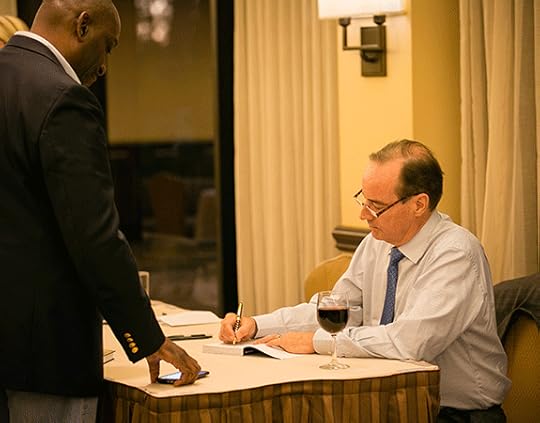
Harry signing his new book, The Sale of a Lifetime
That’s one of the best things about him, in my opinion. Harry’s always eager to talk to his readers, whether they’re old or young, whether they’re fresh on the financial scene or have decades of experience under their belt. And when he gets to meet them face to face, you can clearly see how passionate he is about helping them succeed.
The past three days have been an invaluable experience for me and everyone else who attended or LIVE Streamed the event. It’s not one any of us will ever forget.
Tomorrow I’ll give you a wrap-up of the entire event, but for now I think I’ll sit outside and enjoy some of this sunny Florida weather before heading back home to Pennsylvania.
Until tomorrow,

Jen Junggust
Your 2016 IES On-the-Ground Reporter

The post Exhausting, but So Very Worth It appeared first on Economy and Markets.
October 22, 2016
Doing Things Differently
This morning we heard from Josh Bennett, who discussed the benefits of establishing a domestic asset protection trust (some of which include preservation of privacy, estate tax minimization, and asset protection).
Up next was Ben, one of our own research analysts at Dent Research. Ben does things a little differently than everyone else, using what he calls “social media analytics” to put his finger on the pulse of the markets. And yes, you read that correctly – social media! How cool is that?
Here’s how it works…
Ben’s system essentially allows him to “hear” what high-level executives and investors are thinking.
Any time that an analyst, stock picker, research house, or even a corporate executive or employee uses the Net to communicate, Ben’s actually able to monitor their conversations via public data sources – all through the new MarketVOX indicator that he’s developed!
Now, I know what you’re thinking, and yes – this is perfectly legal. He’s not violating anybody’s right to privacy here.
But, the best part about Ben’s strategy is that a lot of this information isn’t ever going to be reported in the news by the mainstream media, and that’s because they simply don’t have access to the same amount of data that Ben does.
That gives you a leg up when it comes to making trades, because most other people won’t even know about them. So, if you want to have all the conversations and thoughts of many of the top players on Wall Street right at the tip of your fingers, you’ve got to check out what he’s doing.
After Ben, we heard from Barry Potekin, Vice President of the RMB Group.
Barry’s presentation was all about opportunities that you can find lying outside of the stock market. I’d say it’s pretty relevant considering all of the negative comments we’ve heard about stocks this weekend, and especially since their conditions don’t seem to be improving any time soon.
The RMB Group that Barry’s a part of is a collection of brokers and traders that manage different commodities. The advantages of commodities are many, but perhaps the single most powerful tool in their arsenal comes from the fact that they offer true diversification in uncorrelated asset classes.
As Barry himself said, to the chuckle of many in the crowd, “I’ve made an awful lot of mistakes in my time, but the one mistake I never made is putting all my eggs in one basket.”
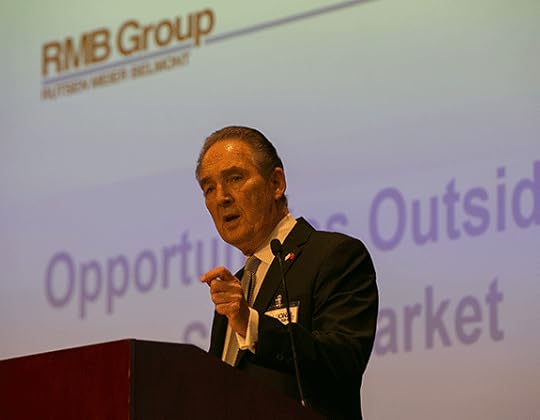
Barry Potekin, talking about opportunities outside of the market.
When I last spoke to you, I told you that Dr. Lacy Hunt had just come one stage to talk about the debt and deficits plaguing the U.S. financial system. I’ve been looking forward to hearing Lacy speak ever since I found out that I was coming to IES, because everyone I talked to beforehand had the same two things to say about him:
That he’s a truly amazing public speaker, and
That he’s one of the nicest men you’ll ever meet.
Well, they were correct on both accounts.
Lacy has a very commanding presence, and it didn’t take long for me to figure out why he’s been so popular at all of our previous Irrational Economic Summits (by the looks of it, nearly all of the conference attendees showed up to hear him talk this morning.)
Lacy really drove home the fact that, as the federal government has sold off more and more of its debt, we’ve seen a shift in savings going from the private sector to the public sector as a way to essentially atone for its sins.
And as a result, the private sector has been less active in spending money – so, the economy’s weakened and interest rates have been driven considerably lower.
Lacy also explained that we haven’t gotten any better simply because we’re “deleveraging.”
See, what most people – ahem, Keynesians – don’t seem to understand is that yes, if we hadn’t borrowed money we would have had less immediate spending, but increasing our debt now only furthers problems in the future.
And yet still more and more QE has been pushed into the global economy.
You know that old saying, “If at first you don’t succeed, try, try again”?
It needs to be amended to say, “If at first you don’t succeed, try, try again… and then stop.”
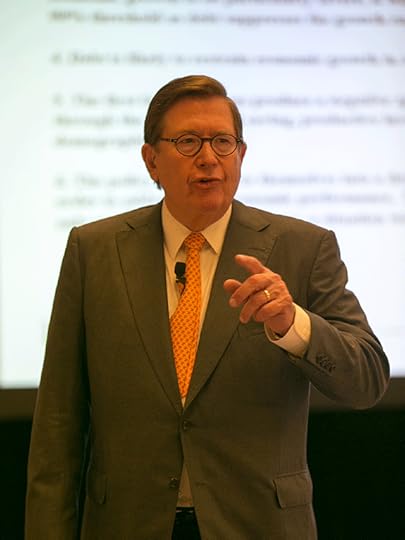
Dr. Lacy Hunt captivating the audience.
Last up to speak was Lance Gaitan, our very own Treasury guru, who wrapped up our morning’s session by talking about his two-pronged approach to making gains off of interest rate volatility.
He takes what most people would consider a boring investment and turns it into double, often even triple gains using both long and short-term methods of trading.
So what is that “boring” investment, you ask?
I will tell you that it’s an investment you’d never expect to be able to make with such ease and the simplicity – and profitability – of it will surprise you.
I’m going to have to wrap it up here. As we speak Howard Lindzon from StockTwits is going over why right now is actually the greatest time to be an active investor, and I don’t want to miss anything.
Tomorrow morning I’ll let you know how the rest of the day goes. I’m also going to visit a couple of the workshops this evening, including one that Lacy’s hosting about all of the fallacies surrounding macroeconomics.
If my suspicions are correct, my night will be filled with several, “I didn’t know what I didn’t know” moments.
In the meantime, remember to check #IESPALMBEACH on Twitter. We’re posting lots of interesting snippets there that I just haven’t had the time to fill you in on.
Alright, now I really must go.
Talk in the morning,

Jen Junggust
Your 2016 IES On-the-Ground Reporter

The post Doing Things Differently appeared first on Economy and Markets.
The Scandal of Money
And just like that, it’s the third and final day of our Irrational Economic Summit in Palm Beach, Florida.
The first two days went off without a hitch (mostly), and brought a ton of useful information to our attendees. I have no doubt that today will be the same.
I hope you’ve had a chance to follow along with us on Twitter, using #IESPALMBEACH. But, in case you happened to miss yesterday’s events and my emails, here’s some of what went on in the afternoon…
After a brief lunch break, Raoul Pal took the stage to cover his macro view of the global economy. I really enjoyed watching his presentation, and not just because of the British accent.
Raoul’s framework is based on the Business Cycle, which dates all the way back to ancient Egyptian times. The premise is pretty easy to follow: returns are weak when the Business Cycle is weak, and they strengthen when the Business Cycle is strong.
You get one guess to figure out where this cycle is right now…
That’s right! We’ve hit a low period. Raoul actually told us that his “spidey senses” are on high alert because all signs are pointing toward a coming recession (if we aren’t in one already)…
Asset prices have hit recession territory as the ISM continues to weaken, global trade is falling fast, oil prices are a disaster, and equities are looking precarious.
What’s the one bright spot in all this darkness, you ask?
Well, lucky for us, it’s the dollar.
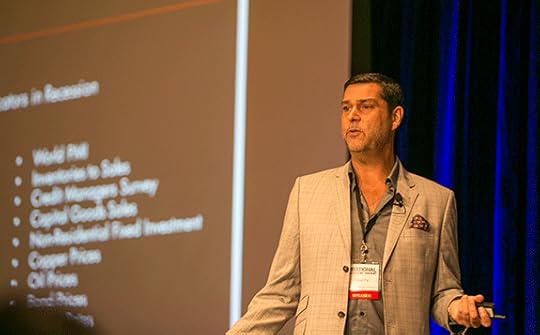
Raoul Pal explains why the dollar will rule in the days ahead.
Raoul explained it like this: when the rest of the world slows down and selling to the States declines, all of those other countries who aren’t exporting to our shores are short on U.S. currency. So, as of right now, the rest of the world is desperate for the dollar.
It was about this time that Charles, who was sitting next to me, leaned over and said, “I think I’ve got an analytical man crush on Pal.” (I’m being dead serious by the way; you can’t make this stuff up.)
Up next was Sequinox President Joe Wirbick, who offered some very helpful insight to audience members either close to, or beginning to plan for, their retirement.
Joe has three keys to success when it comes to retiring happy, and with enough money to last throughout your golden years. The best part is that he said you don’t actually need to retire with millions in the bank to have met retirement “success” – a common myth that most people fall for.
Instead, really focus on preserving the money that you’re making today. Then, and here’s the important part…. use Social Security to your benefit!
Not sure how? Don’t worry. Joe explains it all right here.
Up next after Joe was John Del Vecchio, our resident forensic accountant.
John has a brand new service called Hidden Profits. Its mission? To find companies that actually pay their shareholders first before themselves because, let’s face it – most companies don’t give a damn about their investors.
The real trick is finding companies that pose the least risk to you if you sink your money into them, and let me tell you, John’s got this one down to a science.
See, risk is measured by…
Company value
Earnings quality
Shareholder yield
Once you’ve found companies of quality that pose a minimal amount of risk to you (I say minimal, because no company is 100% bulletproof), you need to find an investment that’s on sale.
Now, don’t worry if this seems a bit daunting. John acknowledged at the beginning of his session that Hidden Profits could be a real bear. In fact, one woman wanted to come and see his speech but was afraid that she wouldn’t understand any of it.
That’s why John gave audience members a real recommendation that they can pull the trigger on today – and for this first one, he’s done all the work for you!
Oh, and that lady I mentioned? She ended up coming to the session anyway, and I promise: if she didn’t run away screaming, you won’t either.
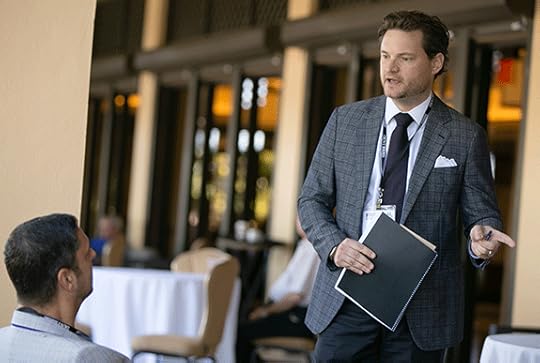
John talking to Raoul after his general session.
Last to present for the day, but certainly not the least, was George Gilder, Co-founder of the Discovery Institute. His provocative presentation was titled “The Scandal of Money,” and boy, is that a topic most relevant today!
George has a truly philosophical view of money. After he left the stage Harry said, “That man is way smarter than me.”
That’s saying something!
George’s point is that wealth is knowledge, and if that’s the case, then growth is the act of learning. Information, when it comes to us, is the surprise.
And humans? We’re the driving force of demographics. We’re complex, not just a box of incentives responding aimlessly to outside stimuli. It’s because of that inherently human trait that man won’t allow himself to be manipulated by incentives fostered by the government – especially over something as scarce as money.
And speaking of money, George has a really interesting take on Bitcoin. To find out what that is, and to perhaps get a firmer grasp on his unique philosophy, check out George’s presentation for yourself.
Let me tell you, IES is not for the faint of heart. After only a brief, 10-minute respite following the presentations, it was back to the races for our first round of workshops.
I can’t go into every one of them now, but I will say that one of the workshops that I went to last night was hosted by Harry, and Brexit was the topic. Before last night, I thought I’d heard everything there was to say about the implications of this historic vote, but then Harry managed to shock me with one bold statement about globalization.
Looking Ahead
Be sure to read the next email that I send you later today.
Among the lineup of speakers presenting this morning is Dr. Lacy Hunt of Hoisington Investment Management. Harry has said time and again that Lacy is one of his favorite economists, and I’ve heard rumor that the presentation he’s giving today on the U.S. budget (or lack thereof) will be more than a little eye-opening.
In fact, Lacy’s on stage now, so I’ve really got to dash!
I’ll meet up with you again this evening to discuss Josh Bennett’s domestic asset protection plan…
Explain how Ben uses more than 3.9 million pieces of market communication to tune into the “unheard voice” of Wall Street…
Provide you with the opportunities that the RMB Group’s Barry Potekin sees lying outside of the stock market…
And show you how Lance profits from interest rate volatility.
For now, reporting to you live from Palm Beach,

Jen Junggust
Your 2016 IES On-the-Ground Reporter

The post The Scandal of Money appeared first on Economy and Markets.
October 21, 2016
Strategies for Navigating a Low-Growth, Low-Inflation Environment
I’m back bringing you coverage of Day 2 at our fourth annual Irrational Economic Summit.
This morning I shared with you the details of what Harry, Dan Mitchell and the Honorable David Walker told audience members yesterday – and man, were there some fireworks!
In case you missed my email this morning, here’s a recap of everything that went down:
In his opening presentation, Harry shared details on the coming “Sale of a Lifetime” that will be available once the worst market crash in history finally begins. He said that while you will be able to find pockets of opportunities in the years ahead, you’ll need to be invested in the correct sectors and have a firm understanding of why they’re climbing higher and for how long.
Dan Mitchell told our viewers that the absolute worst thing that you could do to try to stimulate the economy is raise taxes.
And David Walker told us that the core of our country’s problems comes down to the fact that the government has grown too big, promised too much, and needs to be restructured.
After the presentations were over we had an amazing reception sponsored by our friends at EverBank. I wanted to chat with Harry to see how he thought the first day had gone, but there was a crowd of people around him so large that I couldn’t even get close. Thankfully, the photographer has a zoom lens!
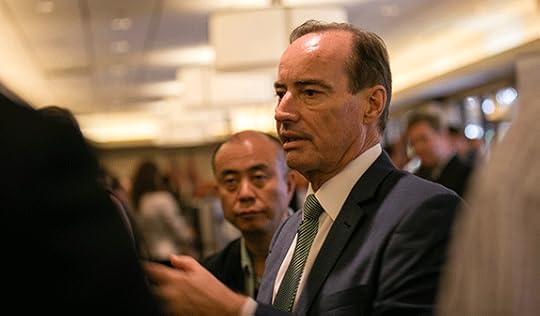
Harry talking to attendees at the reception.
If you could believe it, this morning was even more jam-packed than our first day. We started bright and early at 8 a.m., and while I didn’t think it was possible, the presenters bumped the intensity up a couple more notches…
Charles started us off by talking about the ways that you can still find value in an overly expensive market.
The thing that you need to know about Charles is that he’s a value investor, which sets him a bit apart from everyone else and makes him a fantastic Portfolio Manager for Boom & Bust. Basically, being a value investor means that he doesn’t get into forecasting where the markets are headed, per say, but instead looks at where prices are at today and finds investments to make right now.
If you think that sounds easy, it’s not.
He explained that the exorbitant rise in stock prices have been a result of ridiculously low bond yields, but here’s the catch: investors are actually basing these prices on a false signal. I could go into all the details here, but I really think that Charles explains it better himself.
In the most basic of terms, Charles’ view of the market is this: Stocks are priced too high, bond yields may go higher, but only in the short-term, volatility is abnormally low and likely to go higher, and macroeconomic risks are elevated.
So, what’s an investor to do?
He advises that you focus on bringing in as much income as possible. In fact, he went over some really great plays that are active in our Boom & Bust portfolio right now – some of which aren’t even in the stock market! It’s not too late to get in on these investments, and with the IES 2016 Digital Replay Kit, you can watch Charles’ presentation for the full details.
We also heard from EverBank’s VP Chris Gaffney on opportunities that you can find despite the seemingly endless intervention of central banks around the world. He explained that these banks have taken on their absurd monetary policies because of a very real fear of deflation.
I don’t know about you, but I don’t think that makes the pill any easier to swallow.
He went on to say that the most you can do in this low-growth, low-inflation environment is to have a diversified portfolio that’s broken up into different asset classes. It may not be a complete guarantee against disaster, but it’s about as good as you’re ever going to get.
Up next was our very own Chief Investment Strategist, Adam O’Dell. The thing that really stands out about Adam is that he’s not just interested in making money. He actually digs into the heart of investing by analyzing the psychology of the markets.
You see, people are inherently poor decision-makers when it comes to managing their money. But as Adam explained this morning, that’s not entirely their fault.
It all comes down to one basic, instinctual driver… fear.
As soon as volatility comes into the markets, investors are subconsciously gripped with fear. They’re terrified of losing all of their money and, as Adam likes to say, “being left with only cat food and ramen noodles to eat in their retirement.” That one got quite a few laughs from the audience.
The question comes down to this: how do you manage your fear response and avoid acting irrationally? This gets especially difficult because, as Adam stated, you’re not always even aware on a conscious level that your decision-making has become compromised.
The solution is actually surprisingly simple: Pick an investment strategy that you feel comfortable with, and then follow his two rules…
Follow a systematic approach, and
Exert discipline to follow that strategy.
Now, don’t get me wrong. I realize that it’s not always easy to follow through on a trade when stock prices fall out of bed, but if you follow Adam’s advice, you’re more likely to make – and keep – your money in the long-term.
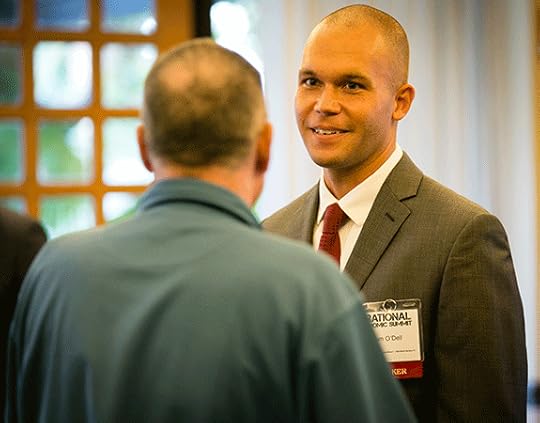
Adam answering a subscriber’s question.
Finally, Rodney closed out our morning sessions with his talk on “The Recurring Death of the Dollar.” We get a lot of questions from our subscribers on where our editors see the dollar going in the future, and Rodney clearly set the record straight today.
Very simply, the dollar’s not going anywhere.
The big fear right now for investors is China. But, as Rodney explained, the last thing that the Chinese want to do is dethrone the dollar. In reality, they really want to devalue the yuan. And the whole idea of any forthcoming Chinese attack on the dollar ignores the fact that SDRs (which are based on a basket of currencies) aren’t big enough to cause a problem for any of the five currencies that they’re comprised of.
Seriously, get this: the amount of SDRs in existence only adds up to $285 billion…
As Rodney put it: “That’s like a rounding error, right?”
I hope you’ve been able to tune into these presentations (if not, you can always watch them at your leisure with the 2016 Irrational Economic Summit Digital Replay Kit we’re making available during the conference). With such a wide range of speakers and topics, I can’t imagine that you wouldn’t be able to find a strategy or investment that really speaks toyou.
Who’s Next?
We’ve already absorbed so much information from our speakers this year that it’s hard to believe there’s still another day to go. But that’s the kind of quality advice we feel you deserve, so that’s exactly what we’re going to deliver.
This afternoon Real Vision TV founder Raoul Pal discussed his global macro view of the economy.
And Joe Wirbick filled us in on everything you’ve never been told about retirement.
Then John, our resident forensic accountant, told everyone how to invest in companies that actually pay their shareholders first. If you’re tired of trying to turn a profit with companies who don’t give a damn about their investors, then you’re going to want to hear what John has to say.
Stay tuned for my next email. I’ll give you all the details on this afternoon’s sessions tomorrow morning.
We’re only halfway through the Summit and there’s still so much left to report!
Until tomorrow,

Jen Junggust
Your 2016 IES On-the-Ground Reporter
P.S. I’m sending you what highlights I can, but nothing that I write can compare to actually watching these guys in action. Sign up to receive our 2016 Irrational Economic Summit Digital Replay Kit. When you do, you’ll also gain access to six exclusive workshops, plus a digital copy of Harry’s new bestseller, The Sale of a Lifetime. Hurry though, because this offer will only be available to you for a few more days!

The post Strategies for Navigating a Low-Growth, Low-Inflation Environment appeared first on Economy and Markets.
Too Big! Too Much!
Have you ever been body slammed by a wave just as you step into the ocean?
Or stepped out into a gale-force wind and been forced back a step or two?
Well, that’s what it was like for those of us attending or LIVE Streaming the Irrational Economic Summit yesterday!
Talk about an information-packed afternoon!
Rodney took to the podium first to start us off, delivering a warm welcome to everyone. Some have traveled from far-off corners of the country – and beyond (I met someone who flew in all the way from Australia) – to be here for our fourth annual Irrational Economic Summit.
And after a quick introduction to each of the speakers, we were off to the races, with Harry leading the charge!
He almost bowled people over when he shared with them details of “The Sale of a Lifetime.” (This is also the title of his latest bestselling book, which you can check out here.)
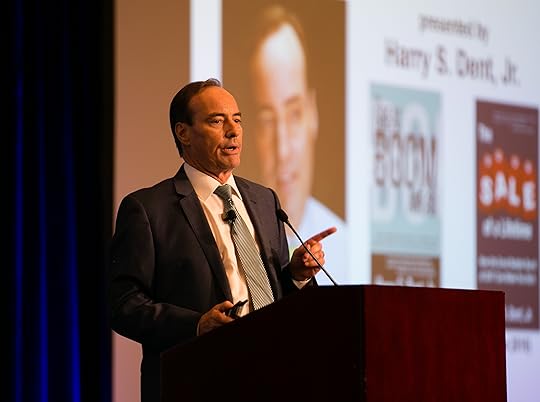
Harry telling it to the audience straight!
Harry isn’t a man to mince words.
He started right off by telling everyone that we’ve got a social and political war brewing in the U.S., and that when, not if, Hillary wins the presidency, she’ll inherit the worst economic collapse of our lifetimes.
It’s this kind of brutal honesty that makes Harry such a captivating speaker. He’s a zero-bullshit kind of person, and you know that whatever it is he’s telling you, he’s telling it to you straight.
So I wasn’t surprised when he laid it all out on the table yesterday.
Harry told the audience that we’ve seen a steady decline in demographics since 2007, which correlates exactly with the four key cycles he uses to predict booms and busts years, sometimes even decades, into the future. Why? Because they’re all pointing down right now, and won’t start to point up again until 2020.
But that doesn’t mean you can lose your head when the markets turn and buy just anything to make a profit. It’s not going to be that simple this time around. Instead, you’ll need to be in the right sectors and have a good understanding of why they’re climbing higher.
He then went on to give the triggers that he sees starting the next great depression – a few of which could occur within the next year. The most dangerous indicator is Italy. When its market finally crashes, it’ll be curtains for the rest of the world.
And don’t even get me (or Harry!) started on the state of global housing markets.
Areas like Shenzhen in China have 66 sq. ft. “apartments” selling for $132,000, yet Harry actually said at one point: “I couldn’t talk one billionaire or multimillionaire into selling real estate if I set myself on fire in front of them.”
Does that not sound like extreme bubble denial to you?
Following Harry’s presentation was Dan Mitchell, Senior Fellow of the Cato Institute. Now, Harry’s a tough act to follow, but Dan delivered! He talked about the coming election and the grim future that America’s economy is facing. The takeaway? Things aren’t looking good.
On the one hand, you’ve got Trump, who’s a can’t-win situation, and on the other you’ve got Hillary, who’s a no-win situation.
Dan sees her huge tax increases bankrupting the country and leading to more debt problems in the future, and it’s a strain that our country simply can’t take on.
With such dismal choices in front of us, and our country looking more and more like Greece every day, Dan told us that now was the time to start planning your escape options. Talk about a perfect follow-up to what Harry hinted at earlier.
Up next was our keynote speaker, the Honorable David Walker, who served as the former Comptroller General of the United States. To say the least, the guy is a really big deal.
David explained that the core of our country’s problems has boiled down to three things: The federal government has grown too big, promised too much, and needs to be restructured.
But, all hope is not lost.
David shared with us his outstanding reform ideas to cut down on unnecessary spending and get our country back towards a more balanced budget long-term.
I don’t have the time or space to go into all the details with you right now. All I can say is that you should really check out his plans to bring down debt-to-GDP levels and bring lower tax rates to both corporations and individuals.
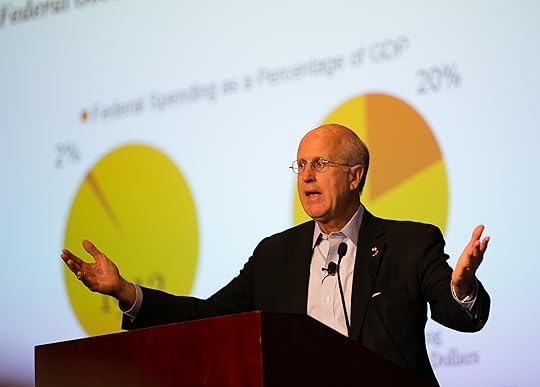
David Walker, talking about how we can REALLY lower tax rates.
He ended his presentation on this note: Current fiscal and monetary policies are unsustainable, but it’s not too late to create a better future. There will be pain. It will be difficult and take a level of perseverance not seen for many years to get us back on the right track, but these reforms can and must be done.
David echoed these words again during his panel discussion with Harry, which followed directly after his talk. This was the time for audience members to ask whatever questions they had, and while we saw a variety of very smart, well-put-together inquiries, one in particular stood out to me.
A gentleman asked about the security aspects that go along with living in this day of civil unrest. What he really was asking was, “Are there any safe places left to live?”
Harry told him that where you live will be very important in the future, and recommended that moving to exurban areas would be beneficial. To find out more of what he said, you can get all of those details right here.
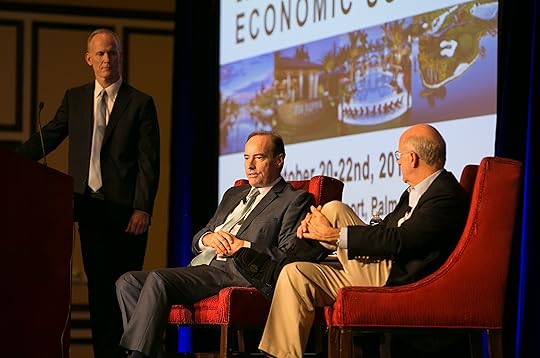
Rodney, Harry and David, answering audience questions.
Seriously, what a way to end our first day at IES!
I already feel like I’ve learned more than my brain can absorb, and so has everyone else that I’ve talked to so far.
In fact, here’s what one of our subscribers to Boom & Bust had to say when I caught up with him at David’s book signing:
“If I were Donald Trump, I’d hire David Walker as a financial manager. He clearly knows what he’s talking about and sounds like he could right the ship with our economy’s finances.”
And I heard another member telling his friend during our cocktail hour that he was enjoying our Summit so much that he already “couldn’t wait to attend the next Irrational Economic Summit in Nashville.”
And to think that this was only the beginning of our time here in Palm Beach.
On the Cards Today
Today we get to hear both Charles and Adam talk about how to find value in today’s wonky market.
With stock prices near all-time highs and yield at depressing lows, I think we could all benefit from a little help maneuvering this bleak economic landscape.
We’ll also hear from Chris Gaffney on the opportunities he’s been able to find despite unending central bank intervention…
Don Hosmer on his unique way to profit with low-cost energy reserves using money you would otherwise pay towards federal and state income…
And Rodney’s take on the recurring “death” of the dollar, among many others.
I’ll get back this afternoon with the highlights from those presentations. In the meantime, you can follow our Summit events on Twitter using #IESPALMBEACH.
Talk later,

Jennifer Junggust
Your 2016 IES On-the-Ground Reporter

The post Too Big! Too Much! appeared first on Economy and Markets.
October 20, 2016
Are You Ready? It’s About to Start!
In just a few minutes, our fourth annual Irrational Economic Summit will be underway. Are you ready?
Let’s do this!
To say the crowd is humming with excitement would be an understatement. As I write this, people are filing into the Ballroom Foyer of the PGA National Golf Resort, our “home away from home” for the next three days.
We couldn’t ask for a more beautiful venue to host our conference this year. If I was a golfer, I’d be itching to tee up. In fact, I’ve already heard a few conference guests talking about their plans to walk the fairways before they head home!
Before I get too carried away, let me introduce myself: I’m Jennifer Junggust, Junior Managing Editor at Dent Research. And for the next few days, I’ll be your eyes and ears at IES. I’ll be bringing you on-the-ground information straight from our speakers and Summit attendees. It’ll be like you’re right here with us!
This morning I woke up bright and early to attend a staff breakfast meeting, where our in-house team of experts gathered together to discuss the logistics of our massive itinerary – the calm before the storm, if you will.
Our publisher, Shannon Sands (an incredibly smart force of nature), set the tone with this statement: “This year’s Irrational Economic Summit is going to be our best and biggest event yet… even if it kills us!”
The nervous chuckles that echoed around the room meant we knew she was serious… and we’re ready to make it happen. After all, it’s YOUR wealth and success at stake here. This is all for you. All about you.
The stakes are high. And we’re up for the challenge!
Once we’d gone through the plan one last time, we were off to our stations to get the ball rolling. Between quick cups of coffee, I got the chance to mingle with a few of our editors and really pick their brains about what they’re most looking forward to at this year’s event.
Here’s some of what they told me…
“David Walker is one of my can’t-miss speakers this year,” said Rodney. “As the former Comptroller of the United States, he’s one of the few people who I think has a true understanding of our debt problem, so I’m very interested in hearing what solutions he’d propose to get us on the right path again.”
Charles Sizemore, our resident retirement expert and income guru, echoed Rodney’s thoughts, saying: “I’m looking forward to hearing a little common sense in a world gone mad. I’m particularly looking forward to hearing David Walker speak about the state of America’s finances. “This presidential election – that’s come down to two people who have no business seeking the office – is a distraction from the very real problems facing the nation.”A distraction? That may be putting it mildly.
Harry recently called the power struggle between Trump and Clinton supporters a “dark and ominous cloud devouring everything in its path,” widening the political and social gulf tearing this great country asunder.
In fact, he told me just this morning that the geopolitical unrest circling the presidency is just one of the signs that’s telling him the bubble we’re in is nearing its end. “It makes my new book, The Sale of a Lifetime, even more timely,” he said.
To kick off the Summit, Harry’s first presentation this afternoon will actually be on all of the unique profit opportunities that will be available in the next great crash… but only if you know where to look, as he does.
“I’m really looking forward to that presentation,” Adam told me. “Harry’s very captivating and insightful when he talks – and he’s a real ‘out of the box’ thinker.”
I, too, can’t wait to hear what Harry has to say.
And if you weren’t able to join us this year in person, or register for the LIVE Stream of the event, you don’t have to miss out!
We’re making the conference available to you via our Digital Replay Kit, and we’re throwing in some bonus items too, including a digital copy of Harry’s bestseller, The Sale of a Lifetime, and the audio of six private workshops (Not even attendees, unless they’re Network members, have access to these!).
Getting the Digital Replay Kit, and all the bonus material, is as simple as clicking here.
One thing’s for sure: this year’s conference couldn’t have come at a better time, as Harry said yesterday.
With all of the uncertainty surrounding the election, the Fed, and the looming debt crisis both at home and abroad, you need to make a plan for your financial future now more than ever.
Our 2016 lineup of speakers – including the Honorable David Walker, Dan Mitchell, Chris Gaffney, Raoul Pal, Dr. Lacy Hunt, Andrew Pancholi, and Howard Lindzon, just to name a few – will give you all the insight you need (and then some) to survive and thrive through these next few years.
That’s all I’ve got time to say for now. Rodney’s clipping on the mike, getting ready to kick us off. I’ll be back tomorrow with some juicy details about this afternoon’s sessions!
Until then,

Jen Junggust
Your 2016 IES On-the-Ground Reporter
P.S. We’re granting access to the IES Digital Replay Kit for a limited time only, so sign up now.
P.P.S. Be sure to follow along with our Summit on Twitter using #IESPALMBEACH. We’ll be posting lots of insightful tidbits from our speakers throughout the day. Meet you back here tomorrow!

The post Are You Ready? It’s About to Start! appeared first on Economy and Markets.
October 19, 2016
This is Going to Be a Doozy!
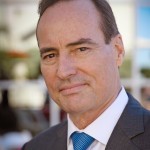
Tomorrow, October 20, we start our annual Irrational Economic Summit… and it’s likely to be the timeliest one yet.
Stocks broke an important level on Thursday, October 13, and this week it could break down harder (if Thursday’s drop wasn’t just another Wall Street head fake).
China’s real estate market has gone into a clear orgasmic blow-off stage, what with the government having made lending so easy in an attempt to offset the massive stock crash of last year.
Deutsche Bank is going down in flames and Italy is facing 18% bad loans and rising.
And the Trump/Clinton all-star wrestling match has gone bonkers!
For all of these reasons, and then dozens more, I can’t wait to hear what some of my favorite speakers at this year’s Summit have to say. I mean, when it comes to really understanding debt and financial asset bubbles and how free market systems really work, these guys are the best of the best!
Our keynote on Thursday is David Walker. I’ve met him on the road twice now, and each time we’ve enjoyed great conversations.
He’s the premier expert on the long-term budget crisis in the U.S. Formally the U.S. comptroller, he has insights most don’t. And having worked with billionaire Pete Peterson’s foundation as the key spokesman for years, he has proved himself a force to be reckoned with. I’m excited to see him take the stage at 3:45 p.m. I’ve even more excited about our panel discussion that will start at 4:25 p.m. (If you’re not joining us in Florida, be sure to request LIVE Stream access so you don’t miss this!)
George Gilder will be back on stage for us on Friday at 4 p.m.
I think it was around 1999 when I debated him at a major conference. What a visionary! He’s the premier expert on how the exponential growth of technologies drives our economy, and why failure is necessary to the success of such technologies and the very dynamics of the free market system. And of course, like David Stockman and I, he sees central banks killing the golden goose with current policies.
He’s spoken at previous Irrational Economic Summits and I know he’s going to impress again this year!
Lacy Hunt is joining us again. He’s spoken at our Summit a few times before, and always had a great reception!
He’s a very rare classical economist that understands debt bubbles, while also being a real world manager of a very successful bond fund that has been right on the deflationary side of the debates for years.
Then there’s Raoul Pal, who’s interviewed me several times for Real Vision TV, his brainchild. He’s an out-of-the box speaker that has encountered more leading edge minds than I can count. I’m very eager to see what he has to say at this critical point in the economy and markets.
And of course our broad team of investment strategists will be there to offer creative ways to play this once-in-a-lifetime great reset in debt and financial assets over the next several years. Few people are going to play the field right in the months and years ahead. Their biases and misinformation has led them over the edge of the cliff onto a platform made of flimsy tissue paper. As the crisis unfolds, they’ll suddenly find themselves plunging to the bottom.
Not our team. They’ve been testing and back testing their strategies for decades. They’re not wearing any rose-colored glasses. They’re removed all biases and strive each and every day to overcome misinformation. There is no one I know more dedicated to helping you invest wisely and safely than the team at Dent Research.
But we want to go beyond helping you survive this great reset. We want to help you make generational wealth. And that’s the focus of my new book, The Sale of a Lifetime. It’s also the focus on my presentations at the conference.
The world will be very different coming out of this next and greatest financial crisis. There will be strong investment opportunities, but they’ll be much more limited than in past long-term bottoms (like in late 1932 and late 1982).
If you’ll be at the conference tomorrow, Friday and Saturday, bring your copy of my book with you and I’ll autograph it.
Other highlights of my presentation include the current political circus and why Brexit is just the beginning of the peak of globalization… and the huge geopolitical fallout we face as a result.
I look forward to talking with you at the conference. If you couldn’t make it out to sunny Florida, then I hope to see you via LIVE Streaming.

Harry
Follow me on Twitter @harrydentjr
Harry Dent, one of America’s foremost financial thinkers, shares his latest shocking prediction for America… the reasons behind it that you’ll NEVER hear about in the mainstream media… plus the solutions he’s using (and you should too!) to ensure you’ll emerge from this massive crisis even better off than before. Click here now to watch this 100% FREE presentation.

The post This is Going to Be a Doozy! appeared first on Economy and Markets.
October 18, 2016
I’ll Have Answers at IES… and a Few Questions
 Years ago I saw a feel-good movie called Blast from the Past. In it, Brendan Fraser’s character was raised by his parents, Christopher Walken and Sissy Spacek, in a bomb shelter in Los Angeles during the 1960s and ’70s. He emerged in the 1980s to get fresh supplies and look for a wife.
Years ago I saw a feel-good movie called Blast from the Past. In it, Brendan Fraser’s character was raised by his parents, Christopher Walken and Sissy Spacek, in a bomb shelter in Los Angeles during the 1960s and ’70s. He emerged in the 1980s to get fresh supplies and look for a wife.
While in the shelter, his parents taught him many aspects of life, including the nuances of the game of baseball. Walken explained many times that when runners are on base and the batter hits the ball, the runners must advance.
But Brendan just didn’t get it… until he saw the game in real life after leaving the shelter. At one point, as he sits in the stands, he echoes his father’s words, “Because he must!”
Seeing, or hearing, something in person can leave a lasting impression.
As I make my way to our Irrational Economic Summit in Palm Beach, which begins Thursday, I’m excited to provide some clarity about the U.S. dollar for our readers.
Time and again I get questions about the death of the dollar. The reasoning might be different (the Fed, the Amero, the ECB, China, the Middle East, etc.), but the line of thinking remains the same. THIS TIME… the dollar will die.
Except, it hasn’t.
And it won’t.
It will continue… because it must.
I’ve explained the strength of the U.S. dollar many times, dispelling the myths of hyperinflation and collapse, but the subject has resurfaced, and with good reason. There’s a new threat to the greenback, and many people claim this is the end.
I don’t agree, and I’ve got the research to prove it. This will be the main topic I cover at our conference on Friday, which you can listen to if you register for LIVE Streaming.
A Sneak Peek of Our Presentations
That’s just one sliver of our time together. Outside of my time on stage in the general session room, and a couple of breakouts, I’ll travel among the different presentations, learning what I can from the incredible cast of characters we’ve put together for this year’s conference.
Harry will open the show as always. I’m sure he’ll cover a few of the topics in his new bestseller, The Sale of a Lifetime. I’ve obviously read the book and know the research well, but there’s something different when you hear it come straight from the author. More than my edification, I want to see how the audience reacts. The education goes both ways during live presentations!
David Walker is definitely on my “can’t miss” list of people to see. I’ll never forget him on the television newsmagazine show 60 Minutes, forcefully telling the world that, “America is broke!”
As the former Comptroller General of the United States and Director of the Government Accountability Office, he knows his topic. What’s so disheartening is that David sounded the alarm in 2007 and 2008, before the financial crisis, and before we added another $9 trillion to the U.S. deficit!
He recently created the Comeback America Initiative, an effort to return the country to our guiding principles and reform our finances. In this crazy election season, where the only common ground is the candidates’ high negative ratings and the fact that no one is talking about our debt, Walker’s message is one we can all get behind! I’m very interested in how he thinks we can right the ship.
A Familiar Face
In addition to the many new faces on stage, there will be a number of returning luminaries as well.
One that always attracts a crowd is Dr. Lacy Hunt, and rightfully so. As a longtime investment officer at Hoisington Investment Management, Lacy has been forecasting slow growth and punishingly low interest rates for years. He put his money where his mouth is, filling his account with U.S. Treasurys, and has earned a handsome return for his clients.
But now interest rates are creeping higher. The Fed might raise rates in December for only the second time in a decade. Plus, there’s talk of the European Central Bank potentially slowing their bond buying program.
Given his track record, it will be interesting to hear Lacy’s take on these two developments. Specifically, where does he think we are headed in the months and years to come?
If you’re headed to Palm Beach as well, I look forward to seeing you at the conference. If you can’t make it this year, be sure to listen to the presentations in real time through our live broadcasting. This is definitely a “can’t miss” event, filled with not only thoughtful research, but also great investment solutions!
See you there!

Rodney
Follow me on Twitter @RJHSDent

The post I’ll Have Answers at IES… and a Few Questions appeared first on Economy and Markets.

